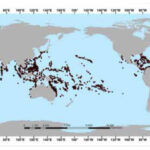Eerder schonk ik aandacht aan de alarmerende berichten over de vermeende aftakeling van de Australische koraalriffen, die – zoals wij dat van klimaatalarmisten gewend zijn – voornamelijk wordt toegeschreven aan de opwarming van de aarde (die zo’n 18 jaar geleden is gestopt).
Onder de titel, ‘The Reef’s Self-Serving Saviours’, schreef Walter Starck in Quadrant een kritische analyse van wat er werkelijk aan de hand is en de stelselmatige desinformatie die over de toestand van het ‘Great Barrier Reef’ wordt verspreid.
All the many and varied claims of threats are based on speculation and the flat-out fabrications of researchers, bureaucrats and activists seeking grants and donations. Let us hope that a political leader emerges to decry and defund the gold-plated alarmists and the immense harm they are doing
Virtually every year for the past half-century news reports have bannered dire proclamations by “reef experts” on imminent “threats” to the Great Barrier Reef. This has sustained an ongoing, ever-growing charade of “research” and “management” aimed at saving the reef from a litany of hypothetical threats conjured up by a salvation industry which now costs taxpayers over $100 million annually. Although none of these “threats” have ever proven to be anything other than hypothetical possibilities or temporary fluctuations of nature, the doomsters never cease to rummage through their litany of concerns to find something they can present as urgent in order to keep the funding flowing.
For a time in the 1970s and ’80s genuine basic research was beginning to reveal a fascinating range of new understanding about the reef. Sadly, this all too brief golden age of discovery faded away when researchers found that the surest path to funding was to go with the flow and float their careers on the rising tide of environmentalism. We now have a whole generation of researchers whose entire involvement has been in the context of investigating various environmental concerns. Understandably, they perceive and/or present every fluctuation of nature as evidence of some threat.
In this process the open, sceptical, inquiring approach of science has been displaced by what has become the environmental facet of political correctness. Like the latter, it is weak on evidence and brooks no questioning of its doctrine, the penalty for any such heresy being personal denigration, the rejection of research funding, and the rejection of papers by peer-reviewed journals. At its most sinister, even dismissal from employment. …
Walter Starck is niet de enige die dit soort praktijken aan de kaak stelt. Van officiële zijde bevestigen de uitspraken van de voorzitter van de ‘Great Barrier Reef Marine Park Authority’ (GBRMPA), Russell Reichelt, dat de verhalen over de verbleking van de Australische koraalriffen op zijn minst sterk overdreven zijn.
Activist scientists and lobby groups have distorted surveys, maps and data to misrepresent the extent and impact of coral bleaching on the Great Barrier Reef, according to the chairman of the Great Barrier Reef Marine Park Authority, Russell Reichelt.
A full survey of the reef released yesterday by the authority and the Australian Institute of Marine Science said 75 per cent of the reef would escape unscathed.
Ook een andere Australische wetenschapper liet zich kritisch uit over de alarmistische berichtgeving over de staat van de riffen. Onder de titel, ‘Reef whistleblower censured by James Cook University’, schreef Graham Lloyd in ‘The Australian’:
When marine scientist Peter Ridd suspected something was wrong with photographs being used to highlight the rapid decline of the Great Barrier Reef, he did what good scientists are supposed to do: he sent a team to check the facts.
After attempting to blow the whistle on what he found — healthy corals — Professor Ridd was censured by James Cook University and threatened with the sack. After a formal investigation, Professor Ridd — a renowned campaigner for quality assurance over coral research from JCU’s Marine Geophysics Laboratory — was found guilty of “failing to act in a collegial way and in the academic spirit of the institution”. …
Commentaar van Walter Starck:
A further exposure of the rot in reef science appeared only a few days ago in The Australian (June 11) entitled “Reef whistleblower censured by James Cook University” reports that Professor Peter Ridd, a very experienced and highly regarded senior professor at James Cook University, was threatened with a charge of serious misconduct for questioning the scientific integrity of some blatantly alarmist claims about the GBR.
In academic speak “serious misconduct” is code for the sack. If a highly regarded senior professor is so treated take it as a given that the 90+% of academics who are more junior in status will take note to avoid any appearance of dissent. It appears that, as far as the administration at JCU is concerned, maintenance of a comfortable place at the public trough must override any considerations of academic freedom or scientific integrity. It would seem the official definition of “serious misconduct” is more concerned with exposing it than with its commission.
Lees verder hier.
Op zijn website veroordeelde Luboš Motl, een bekende Tsjechische klimaatscepticus, de beslissing van de James Cook University scherp.
Peter Ridd is a coral reef expert who used to work with Bob Carter as a postdoc (among others). He has seen lots of evidence that many of the catastrophic claims about the coral reef are based on sloppy or intentionally misleading observations or downright indefensible.
For example, a month ago, Peter Ridd was heard that some recent claims about the death of the coral reef by 2021 are laughable. Also, he decided to replicate or check some recent photographs claimed to show a rapid demise of the coral reef system. He sent some collaborators over there – and, surprise, the coral reef was doing fine.
Because of these inconvenient findings, the corrupt officials at the James Cook University … ordered some official ethical committee to investigate Mr Ridd. It concluded that he “failed to act in a collegial way and in the academic spirit of the institution”. If something like that will occur again, he will be sacked, he was directly threatened.
So if you find a serious mistake in your colleagues’ work, you fail to be “collegial” over there. You know, in genuine science, the virtues are different. It is extremely important to systematically verify the quality of the research. A genuine scientist is always grateful when an actual mistake is found in his research. Instead, the James Cook University openly tells Ridd – and everyone else – that to publish any finding about the coral reef that may be interpreted as good news means an existential problem for the researcher, much like some forbidden activities in the Third Reich. Can the scientific research constrained in this way lead to any outcomes that have a positive value? I don’t think so. …
Aldus Luboš Motl.
Lees verder hier.
De groenbevlogen subsidiezoekers houden maar niet op met het verspreiden van desinformatie en het smoren van kritische geluiden. De moedige wetenschappers die met gevaar voor de eigen carrière daartegen weerstand bieden en de wetenschappelijke integriteit hoog houden, verdienen ons aller respect en bewondering.
Voor mijn eerdere bijdragen over klimaat en aanverwante zaken zie hier, hier, hier, hier en hier.






Triest
De Paus deed het een paar honderd jaar net zo alleen waren de maatregelen wat drastischer. Toch kwam de waarheid boven en weten we dat de aarde om de zon draait.
Is er nog een echte universiteit op deze wereld waar “de wetenschap” nog wetenschap is?
Graag een positieve respons ik begin de moed te verliezen.
Vakgebieden zonder politieke inmenging functioneren nog prima.
De politiek is de hoofdschuldige, door zich zo te bemoeien met een wetenschap die nog in de kinderschoenen staat.
Voornamelijk NGO’s juist
(waar de politiek op reageert)
De media worden er vaak van beschuldigd beweringen van onderzoekers ‘klakkeloos’ over te nemen. Volgens Elseviers wetenschapsjournalist Simon Rozendaal zijn er naast de media verschillende andere groepen in de samenleving die zonder te checken wetenschappelijke beweringen naar buiten brengen als feiten: milieubeweging, actiegroepen maar ook de wetenschap zelf.
http://www.elsevier.nl/wetenschap/achtergrond/2016/06/publicatiecultuur-tast-kwaliteit-van-de-wetenschap-aan-322158/
@ Hugo Mathijsen. De Paus deed honderden jaren net zo. Alleen wat drastisch.
Echter, de Paus is onfeilbaar. En gaat zich nu met het klimaat bemoeien.
De hemel beware mij.
Oh jongens, dat CO2 is zo’n onvoorstelbaar mooi gas. Het zorgt 0.a. voor calciumcarbonaat, CaCo3 (herkent u de CO2 hierin?) wat vervolgens weer zorgt voor botten in vissen en koraal riffen etc.
Maar ook voor limestone, waar dan weer pyramides en zo van zijn gemaakt.
U weet wel, iets met begin der beschaving en zo.
Oh, en bomen en planten en bloemetjes en zo. Die zijn ook gemaakt van CO2.
Als er al één stof/gas voor de absolute God’s prijs in aanmerking komt is het wel CO2.
Het is net Lego, je kunt er letterlijk alles van maken.
Komt het niet uit de aarde, of de zee, dan komt het wel uit de lucht.
En kijk eens wat voor immens mooie kleuren het ook kan opleveren.
Jaja, die God is niet over een nacht ijs gegaan mbt dat CO2. Voor alles een backup-plan: zit het niet in lucht, dan wel in de aarde/vulkanen, of anders wel in zee want anders was alles wat in zee leefde gewoon een kwal zonder botten.
Ik zou wel eens een computermodel willen zien ZONDER CO2, hoe het leven er dan zou uitzien. ZOU er uberhaupt leven zijn?
Hm. Ik denk van niet tot nauwelijks tot eencelligen, maar dan hield het ook op.
Leven herleiden tot wat er toe doet?
Waterstof, zuurstof, koolstof, ijzer, calcium. En later dan weer natrium en chloor en zo. Voor de elektrolytes en zo en voor stofwisseling en maagzuur en snot.
En laat dat nou net de eerste elementen zijn die bij kernfusie gevormd worden.
Waarbij ijzer zich weer terug kan fuseren tot koolstof, waterstof en zuurstof.
En ijzer, best handig om ergens op te kunnen staan en magneten voor aardmagnetisch veld voor aardrotatie, noorderlicht en tegen teveel kosmische straling en van die dingen en zo.
Toeval? Of toch opzet?
Heeft het leven zich gevormd naar de eerste elementen na kernfusie, of is kernfusie bedoeld om leven te creeeren?
Want ‘het’ had zo makkelijk ook heel anders gekund. Geen koolstof, of zuurstof, of waterstof, of calcium. Of dat het element koolstof ook een vloeibare vorm had gekend.
Dan krijg je dus bij een bosbrand gesmolten bomen.
En wat doet deze vloeistof?
Zinken of drijven op water?
En wat als het zou zinken en wat als het zou blijven drijven?
En wat als deze vloeistof zwart zou zijn of doorzichtig?
Kool versus diamant?
Of wat als CO2 een zwart gas zou zijn ipv doorzichtig?
Anders gezegd. Als je nou eens goed kijkt he, dan zit die natuur toch echt wel onvoorstelbaar waanzinnig in elkaar. Letterlijk alles, maar dan ook echt alles, lijkt in dienst te staan van duurzaam en intelligent leven.
Eigenlijk zijn we op een kenterpunt komen te staan.
OF u gelooft politici en media met hun drammerij over global warming, OF u gaat inzien dat de natuur er letterlijk alles aan doet om u het leven mogelijk te maken en te houden en te voeden.
Eigenlijk is alles te herleiden tot twee keuzes:
1] De natuur is bedoeld om u te voeden,
2] U bent voeding voor politici, media, bankiers, globalisten en warmista’s.
De schrijver vindt dat de opwarming van de aarde 18 jaar geleden is gestopt. Zijn denken is toen misschien dan wel gestopt, maar de opwarming in ieder geval niet.
Lijkt er nog steeds op dat de hiatus nog actief is. Zie 36 mnd running mean door RSS satellietdata.
http://www.woodfortrees.org/plot/rss/plot/rss/to:1998/mean:36/trend/plot/rss/from:1998/mean:36/trend/plot/rss/mean:36
grapjas
http://www.skepticalscience.com/cherrypicking-deny-continued-ocean-global-warming.html
waar is toch die gevaarlijke opwarming gebleven. De temperatuur keldert ‘unprecedently’
https://www.dropbox.com/s/5el9dxrl275oep5/Schermafdruk%202016-07-03%2013.40.43.png?dl=0
“Fifteen of the 16 hottest years on record have all been this century, with 2015 being significantly warmer than the record-level temperatures seen in 2014. Underlining the long-term trend, 2011-15 is the warmest five-year period on record.”
http://public.wmo.int/en/media/press-release/2015-hottest-year-record
Recentelijk kwamen een groep gerenommeerde klimaatwetenschappers met een rapport waarin ze eenzelfde periode analyseerden als Erik doet. Zijn dat ook grapjassen meneer van Delft?
http://www.climate-lab-book.ac.uk/2016/making-sense/
Als je uit mijn quote van 3 juli opmaakt dat de opwarming is gestopt, dan ben je een grapjas heer Vruggink.
Nee beste M. van Delft. Wat ik opmaak uit je quote van 3 juli is dat je Erik verwijt een cherrypick te maken wat betreft een periode en je hem daarom een grapjas noemt. Vervolgens wijs ik je er op dat gerenommeerde wetenschappers een zelfde periode analyseren als Erik doet. En daarom vroeg ik aan je: Zijn dat ook grapjassen? Die vraag heb je niet beantwoord.
van Delft
Niemand hier ontkent dat de 18 jarige hiatus periode een hoogvlakte in de temperatuur is. Een hoogvlakte met ruis erop, zoel naar boven als naar beneden. Als je ieder ruis element naar boven als record wil zien, met onwaarschijnlijke nauwkeurigheid ook nog, be my Guest.
De enige reden dat 2015 nogal hoger uitpakt is omdat El Ninjo halverwege 2015 begint. Wil je dat ook op het conto van CO2 schrijven? Die El Ninjo is inmiddels nu alweer krachtig aan het dalen en zal waarschijnlijk binnen enige maanden overgaan in een La Ninja. Op grond van de juni anomalie verwacht Roy Spencer (UAH) geen record voor 2016. Over een half jaar weten we meer.
Erik,
En intussen past Roy spencer zijn eigen reeks nog maar weer eens aan…
Niemand weet wat hij uitvoert en je kunt het niet eens controleren al zou je het willen, geen publicatie en geen broncode….
Totaal onbetrouwbaar dus
Vruggink, ik refereerde aan ““Fifteen of the 16 hottest years on record have all been this century, with 2015 being significantly warmer than the record-level temperatures seen in 2014. Underlining the long-term trend, 2011-15 is the warmest five-year period on record.”
Je bent een grapjas als je concludeert dat de opwarming is gestopt. Maar goed, ik zit hier op het verkeerde blog om een serieuze discussie aan te gaan. Adieu.
Je geeft geen antwoord op mijn vraag beste M. van Delft. Nogmaals: Recentelijk kwamen een groep gerenommeerde klimaatwetenschappers met een rapport waarin ze eenzelfde periode analyseerden als Erik doet. Zijn dat ook grapjassen meneer van Delft?
http://www.climate-lab-book.ac.uk/2016/making-sense/
Vreemde opmerking ook: “De groenbevlogen subsidiezoekers houden maar niet op met het verspreiden van desinformatie en het smoren van kritische geluiden.’
Labohm nam/ neemt geld aan van de Koch broeders via Heartland. Hoe kun je dan zuivere wetenschappers verwijten dat ze geld aannemen van een universiteit?
Maar ach, als jullie de kolenindustrie maar een decennium of wat vooruit helpen, dan zijn er weer miljarden gewonnen, niet waar?
Labohm die geld aan neemt van de Koch broeders via Heartland….. Persoonlijk zou ik er niet zo mee zitten maar jij blijkbaar wel meneer van Delft. En je wilt hier iets mee suggereren. Dit soort beweringen vallen in de categorie moddergooien en mogelijk ook richting laster of smaad. Heb je bewijzen dat Hans geld heeft aangenomen?
De wereldwijde subisidie/donaties/legaten aan internationale NGO’s en actiegroepen alle behept met het klimaatalarmisme is wel 100 tot 1000 keer groter dan het IPCC-kritische budget van het Heartland. Moeten we de aanzienlijke extra subsidies vanuit de olieindustrie ook aan deze internationale klimaatalarmistsiche NGO’s / Actiegroepen (incl. aan Wouter van Dieren) van het IPCC-kritische budget aftrekken voor een eerlijk beeld omtrent wie hoeveel subsidieert en waartoe?
Of van het Heartland aftrekken? :-)
Laster, smaad. Stel je niet aan. Labohm schreef erover op dds. Die berichten zijn nu weg.
We verschillen van mening beste m punt. Dat niet alleen, ik heb niets met moddergooien. Jij bent aan het moddergooien meneer van delft. Ik neem aan dat als Hans Labohm op uitnodiging van Heartland diensten verricht of afreist naar de States op verzoek dat hij daar een goede onkosten vergoeding voor kreeg. Daar lijkt mij niets mis mee. Maar jij suggereert iets wat er helemaal niet is. Jij probeert mensen verdacht te maken. Laag bij de grond noem ik dat.
M. van Delft, Herman Vruggink,
Ik ben nu ruim tien jaar met ‘klimaat’ bezig. Ik heb daarover veel geschreven en vele voordrachten gehouden in binnen- en buitenland. Soms kreeg ik daarvoor wel eens reis- en verblijfkosten vergoed. Maar per saldo heeft deze ‘hobby’ mij veel geld gekost. Als ik alle uren die ik er heb ingestopt zou vermenigvuldigen met een modaal uurtarief zelfs een vermogen.
Als M. van Delft nu eens zou ophouden met zijn fantasieverhalen, zou dat de discussie ten goede komen.
Dat mijn ‘postings’ niet meer op de website van DDS zouden staan is ook een verzinsel van hem.
Zie:
http://www.dagelijksestandaard.nl/author/hans-labohm/page/3/
Ik gooi niet met modder. Labohm schrijft zelf dat ie geld van Heartland heeft gehad, zoals ik stel.
Slinkse verdachtmakingen die nergens over gaan zijn de meest lage vorm van moddergooien beste M. van Delft. Je gaat mij toch niet vertellen dat je over reis- en verblijfkosten valt? Heb je werkelijk iets te melden?
Dds heeft zo te zien een nieuwe site, waar de historie op staat. Wist ik niet. Is ook niet relevant, omdat je zelf schrijft dat je geld van Heartland aanneemt/nam. Waarom zijn serieuze wetenschappers die geld van een universiteit aannemen dan ‘groenbevlogen subsidiezoekers die desinformatie verspreiden en kritische geluiden smoren’.
En het verdienen van een laag uurloon is niet bepaald iets om je op voor te staan.
M. van Delft,
Verzinsels, desinformatie en spijkers op laagwater.
De DDS-site is inderdaad vernieuwd, maar mijn bijdragen zijn altijd toegankelijk geweest.
Als men op een buitenlandse conferentie (van Heartland of welke andere organisatie dan ook) wordt uitgenodigd als spreker krijgt men gewoonlijk daarvoor een onkostenvergoeding. Wat is daar zo bijzonder aan?
Ik was overigens al vele jaren met ‘klimaat’ bezig voordat Heartland zich op dat terrein ging bewegen.
En wat is er mis met vrijwilligerswerk? Vele vrijwilligers doen pro deo werk. Wil je die nu allemaal discrediteren door die onzinnige opmerking dat een laag uurloon bepaald niet iets is om je op voor te staan? Er zijn – gelukkig – nog vele mensen die waardevol maatschappelijke werk doen, waarvoor ze niet betaald krijgen.